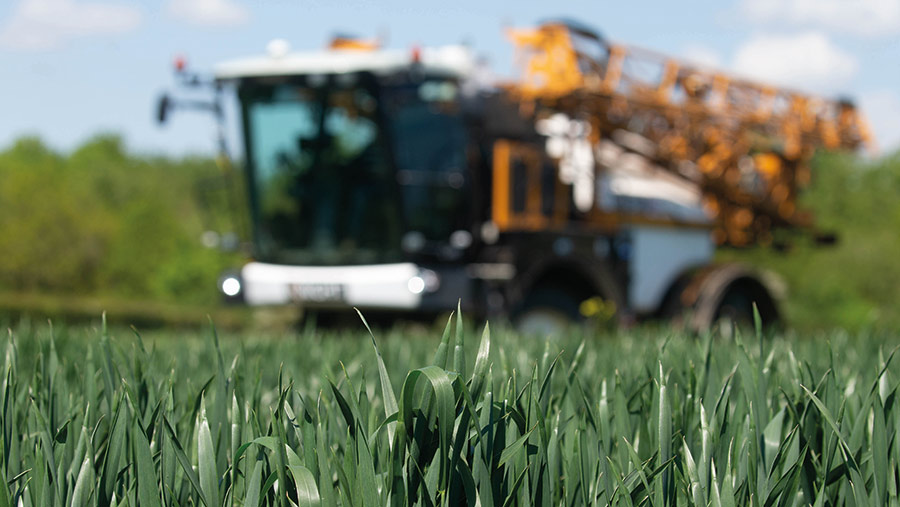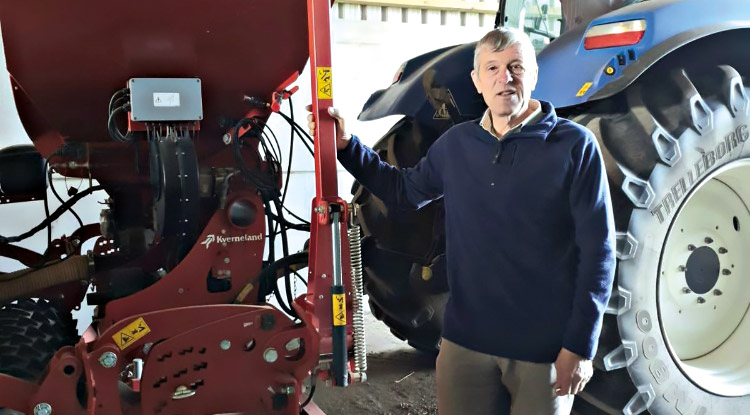Round-up of firms offering strategic arable advice services
 © Tim Scrivener
© Tim Scrivener At a time of unprecedented change in the farming industry, there has never been a greater need for impartial advice and direction.
Given current uncertainty, strategic agronomy services are increasingly being used to help tackle the challenges of rising input costs, volatile markets and changing agricultural policy – often in tandem with the work of independent agronomists.
Launched to fill the gap between regular, expert crop walking and the yearly meeting with a rural business consultant or accountant, these services are in demand as risk increases and decision-making becomes more complex.
See also: How to build a Johnson-Su bioreactor to produce your own on-farm biology
Farmers Weekly asked some of the providers what they were offering.
Crop Dynamics
Now in its 12th year, Crop Dynamics is run by David Robinson and was set up for farmers that were interested in combinable crop agronomy and the science behind the advice that they were being offered.
The current membership of more than 90 farmers is a mix of self-advised growers and those who use the services of an agronomist, with five of the seven meetings held each year taking place on a member’s farm.
The other two meetings – which report on trial results and discuss strategy for the year ahead – are held indoors.
Additional support is provided via crop notes, of which there are 30-35 sets each year covering topical issues, and two agronomy guides a year – the latter of which are sent out as hard copies.
Phone access is also available, so that instant advice can be sought for certain situations.
Covering the North East and East Midlands, with seven established groups in Lincolnshire, Yorkshire, Northumberland and the Borders, Crop Dynamics has expanded as growers have benefited from the comprehensive service provided and told others about it.
As Mr Robinson explains, Crop Dynamics started in 2010 when a group of farmers approached him with an idea of the type of service they would like to see, to help with their decision-making and keep them informed of relevant developments.
“They wanted it to be free from any commercial influence, to have a practical bias and to encourage a two-way flow of information,” he recalls.
“It wasn’t to provide them with spray recommendations, but to be a sounding board and to challenge their thinking.”
Although Frontier Agriculture is behind Crop Dynamics, there is no trade involvement or commercial pressure and members don’t have to be customers of the distributor, he stresses.
“There are no constraints applied and it is impartial. Frontier’s role is to provide the administrative support, so that I can concentrate on delivering the service that farmers want.”
Members pay a yearly subscription based on their arable acreage. That stands at 95p/acre of combinable crops grown, with a cap applied at both ends to create a minimum and maximum amount owed.
“It has worked very well,” says Mr Robinson. “There are no committees or maximum group sizes, but I respond to requests and feedback.
“It makes no difference where they source their inputs from – my focus is on good-quality information and impartial advice.”
More on Crop Dynamics
Claritas Agronomy
Established last year, Claritas Agronomy already has four groups up and running and is intent on providing strategic agronomy direction that comes without any commercial bias.
Led by Keith Norman, who previously headed up Velcourt’s technical team, Claritas has a clear remit and is delivering a higher level of information than is otherwise available from the trade.
The idea and support for it came from Farmacy, which recognised that farmers were looking for more strategic advice, but also appreciated the importance of it being an independent scheme which was open to all – not just its existing customers.
For farmers who aren’t familiar with Claritas, the name of the organisation says it all, stresses Mr Norman. “It’s about providing clarity on a range of technical subject matters. Experience sharing is a big part of what we do – the groups are interactive and really lively.”
Most of Claritas Agronomy’s clients have a retained agronomist and the service provided is very different to the field walking and detailed recommendations they offer, he adds.
“This is not a replacement for your agronomist. It gets you to think, reflect and ask questions, rather than just accepting the status quo.”
There are three in-person meetings a year, taking place in June, December and April. Half of the day is spent inside, to review the latest technical information and discuss evidence, while the remainder is spent in the field looking at crops and discussing how input strategy is working and exchanging views from members on a wide range of crop production issues.
The groups are small – with a maximum of 10 members – so that they get the full benefit of each other’s experience and the learning opportunity.
“There is so much happening in the farming industry that it can be difficult to keep abreast of everything and work out what implications they will have on your business. Claritas acts as an independent filter.”
A yearly subscription of £1,500 is paid by members to join one of the strategic agronomy groups.
There are also two new modules about to be released – covering sugar beet and business management – the content of which will be overseen by Mr Norman.
More on Claritas Agronomy
Green Crop Information
The independent insight needed for more intelligent decision-making is what Green Crop Information aims to provide to its arable farmer subscribers, says the company.
Part of Dyson Farming, it was established in 2020 when the company agreed to host the late Chris Green’s Crop Management Information service, which had a loyal customer base and excellent reputation.
Having relaunched it as Green Crop Information, there are now membership packages for combinable crops and potatoes – with a 25% discount if a farmer joins both – and additional modules on soils and natural capital.
Farmer members come from England and Scotland, with a greater concentration of numbers on the eastern side of the country, reflecting where the cropping is located. Growers and agronomists can join, but not trade representatives or commercial organisations.
There are three in-person meetings/year, held in spring, summer and autumn, which are supplemented by online presentations, briefings and technical notes. The information and insight is delivered to small groups of 10-15 members, as asked for by subscribers.
Richard Meredith, head of Dyson Farming Research, explains there is a real emphasis on technology, as Dyson Farming has the scale and ability to test new developments in a practical setting and use its links with Dyson Technology for engineering expertise.
“A good example of this in practice is that on our farms we have reduced fungicide use by 81%, through the use of the latest green-on-green spraying technology,” he reports.
He believes Green Crop Information is in a unique position to do this type of work and share its findings with members, given the parent company’s knowledge of such fast-moving developments and extensive farming operation.
“We also have access to worldwide research, so can apply the relevant findings to UK production.
“Together with our engineering strengths, it will help our forward-thinking members meet their productivity and profitability targets in a sustainable manner.”
Science, data, ideas and thinking are the hallmarks of the service, which is designed to help with complex decision-making, he adds.
It costs £990/year a farmer member for the combinable crops package and £1,980/year for potatoes, with the additional soils and natural capital modules being £500/year.
More on Green Crop Information
What about Niab Tag?
Referred to as the grandfather of agronomy advice services and well-known throughout the industry, Niab Tag membership is aimed at arable growers who want the necessary technical insight for business improvement.
Part of the UK’s fastest-growing crop science organisation, it claims to translate science and best practice into independent on-farm strategies that improve margins, boost both yield and quality, and build resilience into farming systems.
With 18 local centres, 14 technical committees and a team of regional agronomists, it has access to an extensive regional trials programme and links with a wider industry and research network. Some 80 member-only events are offered each year.
Subscribers can access information at face-to-face events, over the phone, online or via the range of publications produced – or by a mixture of all methods.
Technical conferences and local field days are held, sometimes in collaboration with partners.
Subscription rates vary according to the size of the farm and the package selected, but are typically less then £1/ha/year, with basic farm membership ranging from £575 to £1,883.
In addition, a free 90-day trial membership is on offer.
Information on Niab Tag membership
Case study: Dennis Tonge, Lincolnshire
A long-time subscriber to Crop Dynamics, Dennis Tonge, who farms at Billingay in Lincolnshire, does his own crop walking and is a member of the Woldmarsh Buying Group.

© Ian Tonge
Having used the service since its launch, he is full of praise for the support offered by David Robinson and finds that it suits his requirements for impartial advice.
“I attend the field days and use David as a sounding board,” he says.
“Crop notes arrive most weeks in the growing season and he will even visit the farm if he is passing.”
Despite its backing, there is no influence or involvement from Frontier Agriculture, Mr Tonge confirms. “David is very experienced and he tells us the truth, which is just what we need.”
Case study: Ben Byass, Yorkshire
Impartiality is essential for Yorkshire grower Ben Byass, who relies on Crop Dynamics to provide him with the information he needs to make most of his agronomy decisions.
With combinable crops and vining peas, Mr Byass does most of his own field walking and then attends field days to get a science-based opinion and a better understanding of the most appropriate course of action for the season ahead.
“If there are four possible options to achieve my goal, I will find out which one is the best way, without any pressure to do it or buy certain products,” he says.
Mr Byass also benefits from the lively farmer-to-farmer discussions that take place on such occasions, as honest opinions are always forthcoming and have a learning value.
“In general, farmers get bombarded with lots of information,” he said.
“I am very sceptical about most of it, so having a service like Crop Dynamics helps me identify what’s important for my farm.”
Agrochemical box sets are a good example of a recent development that has needed expert interpretation, he adds.
“Independent guidance on how to use them correctly and understand application rates has been invaluable.”

